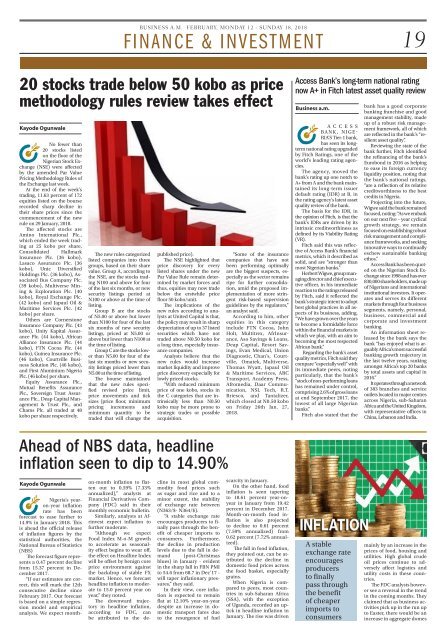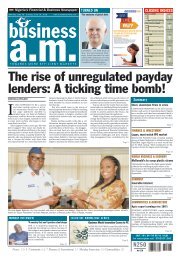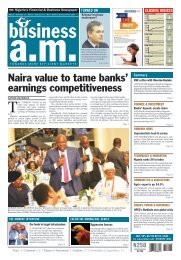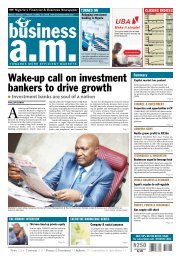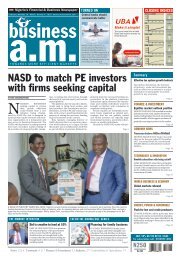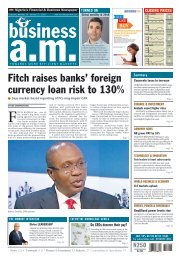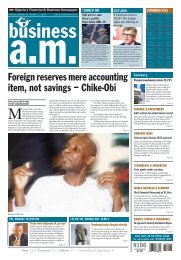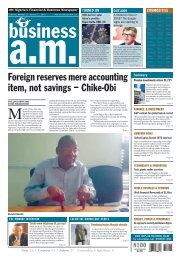12-02-2018
Create successful ePaper yourself
Turn your PDF publications into a flip-book with our unique Google optimized e-Paper software.
BUSINESS A.M. FEBRUARY, MONDAY <strong>12</strong> - SUNDAY 18, <strong>2018</strong><br />
FINANCE & INVESTMENT<br />
19<br />
20 stocks trade below 50 kobo as price<br />
methodology rules review takes effect<br />
Kayode Ogunwale<br />
No fewer than<br />
20 stocks listed<br />
on the floor of the<br />
Nigerian Stock Exchange<br />
(NSE) were affected<br />
by the amended Par Value<br />
Pricing Methodology Rules of<br />
the Exchange last week.<br />
At the end of the week’s<br />
trading, 11.63 percent of 172<br />
equities listed on the bourse<br />
recorded sharp decline in<br />
their share prices since the<br />
commencement of the new<br />
rule on 29 January, <strong>2018</strong>.<br />
The affected stocks are<br />
Amino International Plc.,<br />
which ended the week trading<br />
at 25 kobo per share,<br />
Consolidated Hallmark<br />
Insurance Plc. (36 kobo),<br />
Lasaco Assurance Plc. (36<br />
kobo), Unic Diversified<br />
Holdings Plc. (36 kobo), Associated<br />
Bus Company Plc.<br />
(39 kobo), Multiverse Mining<br />
& Exploration Plc. (40<br />
kobo), Royal Exchange Plc.<br />
(42 kobo) and Japaul Oil &<br />
Maritime Services Plc. (42<br />
kobo) per share.<br />
Others are Cornerstone<br />
Insurance Company Plc. (43<br />
kobo), Unity Kapital Assurance<br />
Plc. (44 kobo), African<br />
Alliance Insurance Plc. (44<br />
kobo), FTN Cocoa Plc. (44<br />
kobo), Guinea Insurance Plc.<br />
(46 kobo), Courtville Business<br />
Solution Plc. (46 kobo),<br />
and First Aluminium Nigeria<br />
Plc. (46 kobo) per share.<br />
Equity Assurance Plc.,<br />
Mutual Benefits Assurance<br />
Plc., Sovereign Trust Assurance<br />
Plc., Deap Capital Management<br />
& Trust Plc., and<br />
Chams Plc. all traded at 48<br />
kobo per share respectively.<br />
The new rules categorized<br />
listed companies into three<br />
groups, based on their share<br />
value. Group A, according to<br />
the NSE, are the stocks trading<br />
N100 and above for four<br />
of the last six months, or new<br />
security listings period at<br />
N100 or above at the time of<br />
listing.<br />
Group B are the stocks<br />
of N5.00 or above but lower<br />
than N100 for four of the last<br />
six months of new security<br />
listings, priced at N5.00 or<br />
above but lower than N100 at<br />
the time of listing.<br />
Group C are the stocks lower<br />
than N5.00 for four of the<br />
last six months or new security<br />
listings priced lower than<br />
N5.00 at the time of listing.<br />
The bourse maintained<br />
that the new rules specified<br />
revised price limit,<br />
price movements and tick<br />
sizes (price floor, minimum<br />
pricing increments and<br />
minimum quantity to be<br />
traded that will change the<br />
published price).<br />
The NSE highlighted that<br />
price discovery for every<br />
listed shares under the new<br />
Par Value Rule remain determined<br />
by market forces and<br />
thus, equities may now trade<br />
below the erstwhile price<br />
floor 50 kobo/unit.<br />
The implications of the<br />
new rules according to analysts<br />
at United Capital is that,<br />
the policy may result in sharp<br />
depreciation of up to 37 listed<br />
securities which have not<br />
traded above N0.50 kobo for<br />
a long time, especially insurance<br />
companies.<br />
Analysts believe that the<br />
new rules would increase<br />
market liquidity and improve<br />
price discovery especially for<br />
lowly priced stocks.<br />
“With reduced minimum<br />
price of one kobo, stocks in<br />
the C categories that are intrinsically<br />
less than N0.50<br />
kobo may be more prone to<br />
strategic trades or possible<br />
acquisition.<br />
“Some of the insurance<br />
companies that have not<br />
been performing optimally<br />
are the biggest suspects, especially<br />
as the sector remains<br />
ripe for further consolidation,<br />
amid the proposed implementation<br />
of more stringent<br />
risk-based supervision<br />
guidelines by the regulators,”<br />
an analyst said.<br />
According to him, other<br />
equities in this category<br />
include FTN Cocoa, John<br />
Holt, Multitrex, AfrInsurance,<br />
Aso Savings & Loans,<br />
Deap Capital, Resort Savings,<br />
Evan Medical, Union<br />
Diagnostic, Chan’s, Courtville,<br />
Omatek, Multiverse,<br />
Thomas Wyatt, Japaul Oil<br />
& Maritime Services, ABC<br />
Transport, Academy Press,<br />
Afromedia, Daar Communication,<br />
NSL Tech, R.T.<br />
Briesco, and Tantalizer,<br />
which closed at N0.50 kobo<br />
on Friday 26th Jan. 27,<br />
<strong>2018</strong>.<br />
Access Bank’s long-term national rating<br />
now A+ in Fitch latest asset quality review<br />
Business a.m.<br />
A C C E S S<br />
BANK, NIGE-<br />
RIA’S Tier-1 bank,<br />
has seen its longterm<br />
national rating upgraded<br />
by Fitch Ratings, one of the<br />
world’s leading rating agencies.<br />
The agency, moved the<br />
bank’s rating up one notch to<br />
A+ from A and the bank maintained<br />
its long-term issuer<br />
default rating (IDR) at B, in<br />
the rating agency’s latest asset<br />
quality review of the bank.<br />
The basis for the IDR, in<br />
the opinion of Fitch, is that the<br />
bank’s IDRs are driven by its<br />
intrinsic creditworthiness as<br />
defined by its Viability Rating<br />
(VR).<br />
Fitch said this was reflective<br />
of Access Bank’s financial<br />
metrics, which it described as<br />
solid, and are “stronger than<br />
most Nigerian banks.”<br />
Herbert Wigwe, group managing<br />
director and chief executive<br />
officer, in his immediate<br />
reaction to the ratings released<br />
by Fitch, said it reflected the<br />
bank’s strategic intent to adopt<br />
best global practices in all aspects<br />
of its business, adding,<br />
“We have grown over the years<br />
to become a formidable force<br />
within the financial markets in<br />
which we play, with an aim to<br />
becoming the most respected<br />
African bank.”<br />
Regarding the bank’s asset<br />
quality metrics, Fitch said they<br />
compare “especially well” with<br />
its immediate peers, noting<br />
particularly, that the bank’s<br />
“stock of non-performing loans<br />
has remained under control,<br />
comprising 2.6% of gross loans<br />
at end September 2017, the<br />
lowest of all large Nigerian<br />
banks.”<br />
Fitch also stated that the<br />
bank has a good corporate<br />
banking franchise and good<br />
management stability, made<br />
up of a robust risk management<br />
framework, all of which<br />
are reflected in the bank’s “resilient<br />
asset quality”.<br />
Reviewing the state of the<br />
bank further, Fitch identified<br />
the refinancing of the bank’s<br />
Eurobond in 2016 as helping<br />
to ease its foreign currency<br />
liquidity position, noting that<br />
the bank’s national ratings,<br />
“are a reflection of its relative<br />
creditworthiness to the best<br />
credits in Nigeria.<br />
Projecting into the future,<br />
Wigwe said the bank remained<br />
focused, noting: “As we embark<br />
on our next five – year cyclical<br />
growth strategy, we remain<br />
focused on establishing robust<br />
risk management and compliance<br />
frameworks, and seeking<br />
innovative ways to continually<br />
eschew sustainable banking<br />
ethos.”<br />
Access Bank has been quoted<br />
on the Nigerian Stock Exchange<br />
since 1998 and has over<br />
830,000 shareholders, made up<br />
of Nigerians and international<br />
institutional investors. It operates<br />
and serves its different<br />
markets through four business<br />
segments, namely, personal,<br />
business, commercial and<br />
corporate and investment<br />
banking.<br />
An information sheet released<br />
by the bank says the<br />
bank “has enjoyed what is arguably<br />
Africa’s most successful<br />
banking growth trajectory in<br />
the last twelve years, ranking<br />
amongst Africa’s top 20 banks<br />
by total assets and capital in<br />
2016.”<br />
It operates through a network<br />
of 383 branches and service<br />
outlets located in major centres<br />
across Nigeria, sub-Saharan<br />
Africa and the United Kingdom,<br />
with representative offices in<br />
China, Lebanon and India.<br />
Ahead of NBS data, headline<br />
inflation seen to dip to 14.90%<br />
Kayode Ogunwale<br />
Nigeria’s yearon-year<br />
inflation<br />
rate has been<br />
forecast to ease further to<br />
14.9% in January <strong>2018</strong>. This<br />
is ahead the official release<br />
of inflation figures by the<br />
statistical authorities, the<br />
National Bureau of Statistics<br />
(NBS)<br />
The forecast figure represents<br />
a 0.47 percent decline<br />
from 15.37 percent in December<br />
2017.<br />
“If our estimates are correct,<br />
this will mark the <strong>12</strong>th<br />
consecutive decline since<br />
February 2017. Our forecast<br />
is based on a simple regression<br />
model and empirical<br />
analysis. We expect month-<br />
on-month inflation to flatten<br />
out to 0.59% (7.33%<br />
annualized),” analysts at<br />
Financial Derivatives Company<br />
(FDC) said in their<br />
monthly economic bulletin.<br />
Similarly, analysts at Afrinvest<br />
expect inflation to<br />
further moderate.<br />
“Although we expect<br />
Food Index M-o-M growth<br />
to accelerate as seasonality<br />
effect begins to wear off,<br />
the effect on Headline Index<br />
will be offset by benign core<br />
price environment against<br />
the backdrop of stable FX<br />
market. Hence, we forecast<br />
headline inflation to moderate<br />
to 15.0 percent year on<br />
year,” they noted.<br />
The downward trajectory<br />
in headline inflation,<br />
according to FDC, can<br />
be attributed to the decline<br />
in most global commodity<br />
food prices such<br />
as sugar and rice and to a<br />
minor extent, the stability<br />
of exchange rate between<br />
(N363/$- N364/$).<br />
“A stable exchange rate<br />
encourages producers to finally<br />
pass through the benefit<br />
of cheaper imports to<br />
consumers. Furthermore,<br />
the decline in production<br />
levels due to the fall in demand<br />
(post-Christmas<br />
blues) in January - evident<br />
in the sharp fall in FBN PMI<br />
to 54.6 from 68.7 in Dec’17 -<br />
will taper inflationary pressures,”<br />
they said.<br />
In their view, core inflation<br />
is expected to remain<br />
flat at <strong>12</strong>.10% year-on-year<br />
despite an increase in domestic<br />
transport fares due<br />
to the resurgence of fuel<br />
scarcity in January.<br />
On the other hand, food<br />
inflation is seen tapering<br />
to 18.61 percent year-onyear<br />
in January from 19.42<br />
percent in December 2017.<br />
Month-on-month food inflation<br />
is also projected<br />
to decline to 0.61 percent<br />
(7.59% annualized) from<br />
0.62 percent (7.72% annualized).<br />
The fall in food inflation,<br />
they pointed out, can be attributed<br />
to the decline in<br />
domestic food prices across<br />
the food basket, especially<br />
grains.<br />
When Nigeria is compared<br />
to peers, most countries<br />
in sub-Saharan Africa<br />
(SSA), with the exception<br />
of Uganda, recorded an uptick<br />
in headline inflation in<br />
January. The rise was driven<br />
A stable<br />
exchange rate<br />
encourages<br />
producers<br />
to finally<br />
pass through<br />
the benefit<br />
of cheaper<br />
imports to<br />
consumers<br />
mainly by an increase in the<br />
prices of food, housing and<br />
utilities. High global crude<br />
oil prices continue to adversely<br />
affect logistics and<br />
utility costs in these countries.<br />
The FDC analysts however<br />
see a reversal in the trend<br />
in the coming months. They<br />
claimed that as business activities<br />
pick up in the run up<br />
to Easter, there would be an<br />
increase in aggregate domes


